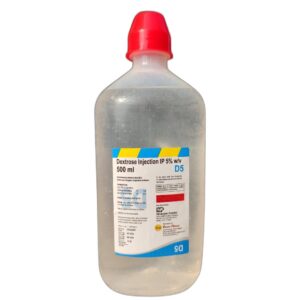DEXTROSE INJECTION IP(5% W/V)
DEXTROSE INJECTION IP(5% W/V): Drug: DEXTROSE INJECTION IP (5% W/V)
Description: Dextrose injection IP (5% w/v) is a sterile, nonpyrogenic solution of Dextrose in water for intravenous administration. It is a clear, colorless liquid that contains 5 grams of dextrose (derived from corn) per 100 mL of solution.
Use: Dextrose injection is used to provide a source of energy (carbohydrate) and fluid to the body. It is commonly used in various clinical situations, including:
1. Treatment of hypoglycemia (low blood sugar): Dextrose injection is used to rapidly increase blood sugar levels in patients with low blood sugar levels, including those with diabetes or insulin reactions.
2. Rehydration: Dextrose injection is used to restore fluid balance in conditions like dehydration, excessive fluid loss, or when oral intake is not possible.
3. Nutritional support: Dextrose injection can be used to provide calories and nutritional supplementation, especially when oral feeding is not feasible or insufficient.
Mechanism of Action: Dextrose is a simple sugar (glucose) that is rapidly absorbed and metabolized by the body. It serves as the primary energy source for cells and tissues, including the brain. When administered intravenously, dextrose is quickly distributed throughout the body, increasing blood glucose levels. This provides a readily available source of fuel for cellular processes and replenishes energy stores.
Dose: The dose of dextrose injection varies depending on the patient’s age, condition, and the intended use. Typically, the recommended adult dose ranges from 250 mL to 1000 mL per day, depending on the patient’s energy requirements and underlying medical condition. Pediatric doses are usually calculated based on body weight and clinical needs.
Side Effects: Like any medication, dextrose injection may cause side effects in some individuals. Common side effects include:
1. Hyperglycemia: Administration of dextrose injection can cause a sudden increase in blood sugar levels. This is particularly important in individuals with diabetes.
2. Fluid overload: Excessive administration of dextrose injection can lead to fluid overload, especially in patients with compromised cardiac or renal function.
3. Local site reactions: In rare cases, injection site reactions such as pain, redness, or swelling may occur.
4. Electrolyte imbalances: Prolonged or excessive use of dextrose injection without appropriate monitoring may cause imbalances in electrolytes, such as sodium and potassium.
5. Allergic reactions: Although rare, some individuals may experience allergic reactions to dextrose injection, including rash, itching, or difficulty breathing.
It is important to consult a healthcare professional for proper dosage recommendations, administration technique, and monitoring when using dextrose injection.

